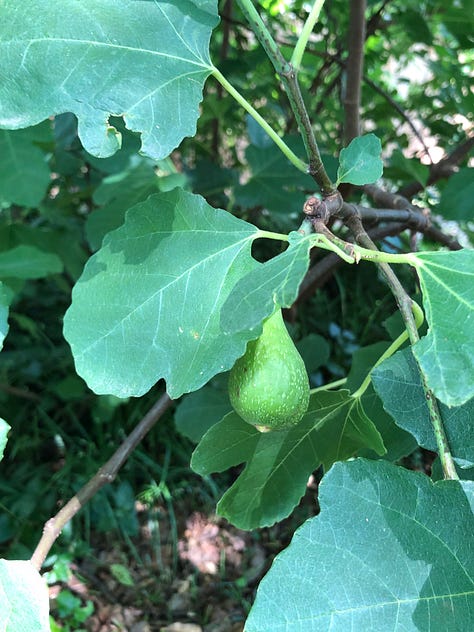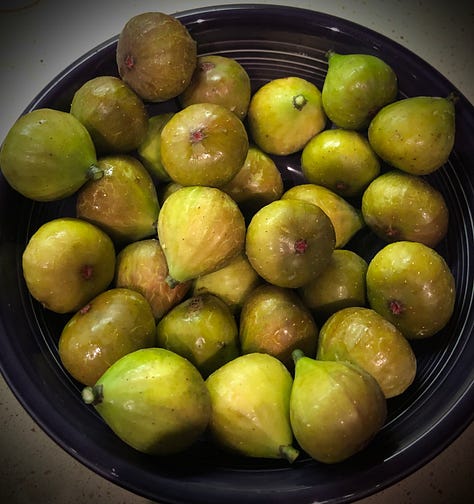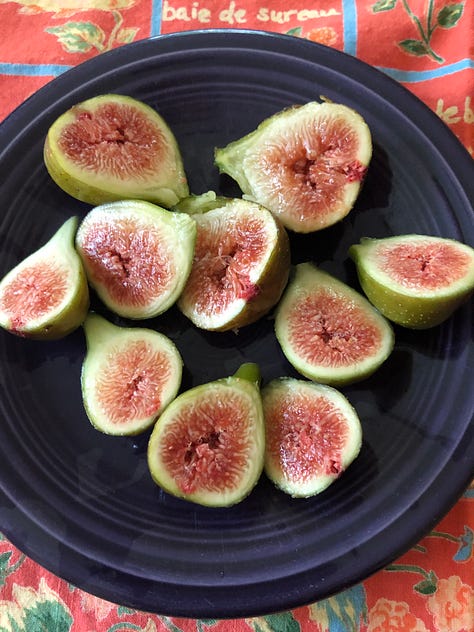Claiming Home: The New Queer American Diaspora is a newsletter I just started. I am a queer Southerner who has lived and loved in the American South for more than 60 years.
This newsletter explores through images and words:
Things I love about the American South;
Frightening new federal and state laws and cases in the United States that further marginalize oppressed communities and are leading some individuals and families to move; and
Portugal, a democratic country more focused on community than the individual, a place where I’m spending more time each year.
I plan to publish the newsletter twice a month.
Since I’m in the process of learning Portuguese, I may publish a Portuguese edition using a language translation app until I’m able to translate my words on my own. No doubt I will make mistakes, but I want to put the effort into trying with the available tools and limited knowledge I have.
Things I love about the American South
Figs
Figs, that’s right. Figs. This summer, I made a fig galette using pastry flour, for the first time, for the dough. The galette crust was as light and flaky as any I’ve ever had. The figs, which I bought at our local farmers market, were ripe and sweet.
I thank Deborah Madison and her cookbook, The New Vegetarian Cooking for Everyone, for this luscious recipe. Madison is rather old-school and does not typically include her recipes online. However, you may be able to checkout one of her cookbooks from your local library. Better yet, buy a copy.



Fresh figs may be difficult to find. This only adds to their allure.
I’ve never seen a grocery store in our area sell them. The fruits bruise easily and are only perfectly ripe for a very short time. They aren’t well-suited for grocery store produce shelves.
Local farmers markets may sometimes have one or two farmers who sell figs. You have to arrive early at the market, though, because the figs disappear quickly.
Growing a Fig Tree
If you’ve tried fresh figs, love them, and want more reliable access, try growing a fig tree or fig bush in your own yard, if you have a yard and the umph needed to get the tree started. To find out how to do so in your region in the U.S., try googling “figs, extension, and [the name of your state].”
Here, in Georgia, the University of Georgia Extension recommends: “The simplest and easiest method of propagating figs is by stem cuttings from an older bush. Make cuttings in late February.” For more information about preparing the soil, planting the cutting, and fertiziling the fig bush, read Home Garden Figs.
Our backyard fig tree, at our former house, took six years to go from shoots a foot or so above the ground to a tree more than six feet tall offering an abundant crop of figs within arm’s reach. Figs are easier to grow than many other types of fruit. I’ve included photos of our beloved tree above, as well as a day’s harvest of fresh figs, and a plate of washed and sliced figs in all their glorious color.
Besides Making Galettes, What Else is Happening in the South This Week?
As I mentioned earlier, this newsletter references some of the horrific laws and actions by elected officials that are all too common. This week’s round-up includes:
Governor Ron DeSantis used grossly inappropriate and violent language to refer to actions he will take with the federal non-partisan workforce if he is elected president. Right now, polls show DeSantis has the second highest level of support among Republican presidential candidates. I won’t include his language in this newsletter, but the Guardian article linked above includes what he has said on multiple occasions.
When I read this Washington Post story about the mother of a 17-year-old trans son in Mississippi, I just stopped. Mississippi has banned gender-affirming care for minors and has included an “aid and abet” clause making it illegal for any adult to try to help a minor obtain this healthcare. What would you do if you were a mother with a 17-year-old trans son who has been receiving gender-affirming care and is now banned state-wide from receiving this healthcare? If the nearest gender-affirming healthcare were 700 miles away and you couldn’t afford to move, what would you do? The article I’ve linked describes the actions one mother took to help her son.
The U.S. Department of Labor stated there has been a 69 percent increase in the number of children illegally employed by companies since 2018. This spring, Governor Sarah Sanders signed an Arkansas law that loosens child labor laws. Children under 16 no longer need to have written permission from their parents to work. The law allows children to work in dangerous environments including meat processing plants, construction sites, and businesses that serve alcohol. Governor Sanders signed this law after Packers Sanitation Services, a major US food sanitation company, illegally employed at least 102 children between the ages of 13 and 17 in jobs where they used caustic chemicals to clean razor-sharp saws at meat processing plants, sometimes working overnight shifts. This law took effect August 1, 2023.
I feel the need to name and acknowledge the dramatic changes I’m seeing in laws and behaviors by elected officials. Violent language from political leaders too often leads to violent actions by their followers. Rolling back child safety laws in the workplace and eliminating healthcare options for vulnerable minorities is unconscionable.
If you would like an analysis of the legal, historical or political changes that are happening in the United States, consider reading the following newsletters Civil Discourse with Joyce Vance; Letters from an American by Heather Cox Richardson; and Lucid by Ruth Ben-Ghiat.
Most importantly, make sure you are registered to vote and you vote in every election.
Next Up - Sagres, Portugal
Finally, the third topic I mentioned I would include in my newsletter is Portugal, a country where I plan to spend more time. The next issue of Claiming Home will include a photo essay about my visit to Sagres, Portugal a remarkable small town overlooking the wild and windy Atlantic ocean.
Claiming Home: The New Queer American Diaspora




